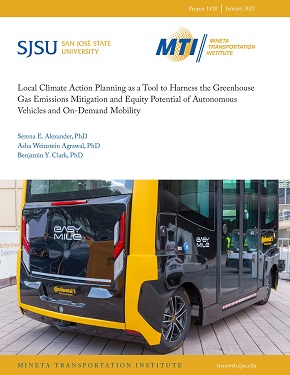- 408-924-7560
- mineta-institute@sjsu.edu
- Donate
Local Climate Action Planning as a Tool to Harness the Greenhouse Gas Emissions Mitigation and Equity Potential of Autonomous Vehicles and On-Demand Mobility
This report focuses on how cities can use climate action plans (CAPs) to ensure that on-demand mobility and autonomous vehicles (AVs) help reduce, rather than increase, green-house gas (GHG) emissions and inequitable impacts from the transportation system. We employed a three-pronged research strategy involving: (1) an analysis of the current literature on on-demand mobility and AVs; (2) a systematic content analysis of 23 CAPs and general plans developed by municipalities in California; and (3) a comparison of findings from the literature and content analysis of plans to identify opportunities for GHG emissions reduction and mobility equity.
Findings indicate that maximizing the environmental and social benefits of AVs and on-demand mobility requires proactive and progressive planning; yet, most cities are lagging behind in this area. Although municipal CAPs and general plans in California have adopted a few strategies and programs relevant to AVs and on-demand mobility, many untapped opportunities exist to harness the GHG emissions reduction and social benefits potential of AVs and on-demand mobility. Policy and planning discussions should consider the synergies between AVs and on-demand mobility as two emerging mobility trends, as well as the key factors (e.g., vehicle electrification, fuel efficiency, use and ownership, access and distribution, etc.) that determine whether deployment of AVs would help reduce GHG emissions from transportation. Additionally, AVs and on-demand mobility can potentially contribute to a more equitable transportation system by improving independence and quality of life for individuals with disabilities and the elderly, enhancing access to transit, and helping alleviate the geographic gap in public transportation services.
Serena Alexander, PhD
Serena Alexander is an Assistant Professor of Urban and Regional Planning at San José State University. Her primary research interests are in the areas of environmental planning, climate action, and land-use and transportation planning. Before joining the SJSU faculty, Dr. Alexander conducted community economic development and environmental policy research at the Center for Economic Development and the Great Lakes Environmental Finance Center at Cleveland State University, where she also received her doctorate in Urban Studies (Specialization in Urban Policy and Development). She holds master’s degrees in Urban and Regional Planning from California State Polytechnic University, Pomona, and Architecture from Azad University of Tehran.
Asha Weinstein Agrawal, PhD
Dr. Agrawal is Professor of Urban and Regional Planning at San José State University. Her research is guided by a commitment to the principles of sustainability and equity: what planning and policy tools can communities adopt to encourage environmentally-friendly travel and improve accessibility for people struggling with poverty or other disadvantages? She has explored this question most deeply through two substantive areas, transportation finance policy and the travel behavior of pedestrians, cyclists, and transit riders. She has a BA from Harvard University in Folklore and Mythology, an MSc from the London School of Economics and Political Science in Urban and Regional Planning, and a PhD from the University of California, Berkeley, in City and Regional Planning.
Benjamin Y. Clark, PhD
Dr. Clark is Associate Professor in the School of Planning, Public Policy and Management and the Co-Director of the Institute for Policy Research and Engagement at the University of Oregon in Eugene, Oregon, USA. His research and external engagement are largely focused on local government management. His scholarship examines how technology can be used to improve city management (smart city technology) and how cities need to be planning financially and managerially for future innovations (smart cities and autonomous vehicles). Before his move into academia, he worked as a public servant at the local, federal, and international levels.
-
Contact Us
San José State University One Washington Square, San Jose, CA 95192 Phone: 408-924-7560 Email: mineta-institute@sjsu.edu






